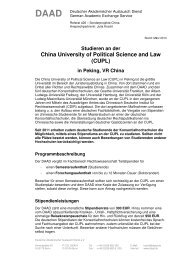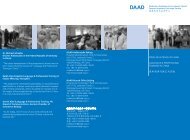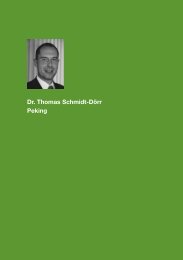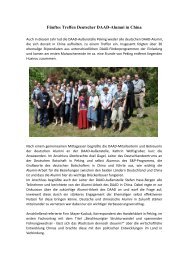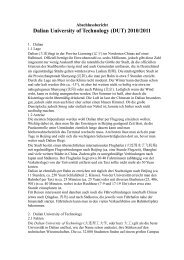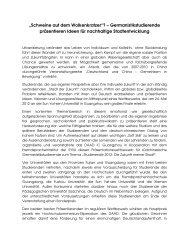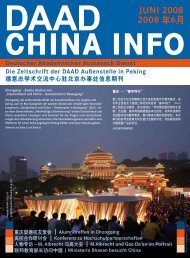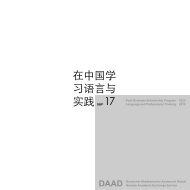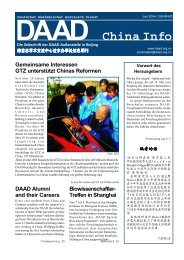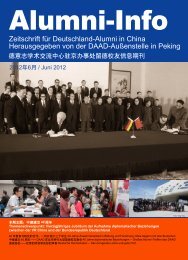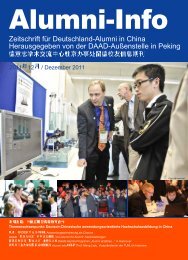China Info
China Info
China Info
You also want an ePaper? Increase the reach of your titles
YUMPU automatically turns print PDFs into web optimized ePapers that Google loves.
A Tale of Three Decades in <strong>China</strong><br />
Michael Kahn-Ackermann can look<br />
back on more than 3 decades of<br />
breathtaking changes in <strong>China</strong>. He<br />
was a student at Peking University at<br />
the end of the “ten chaotic years,”<br />
then founding father of the first Western<br />
cultural institute in <strong>China</strong> during<br />
the reform and opening up period in<br />
the 80s, and he later became head of<br />
the Goethe-Institut in Beijing at the<br />
beginning of the 21st century.<br />
From his office on the 17th floor of<br />
the Digital Tower, Michael Kahn-<br />
Ackermann looks out at the busy Sitong<br />
crossroad, a construction site of subway<br />
line no. 4 and the compound of the<br />
Friendship Hotel. On a clear day, he can<br />
see the Western hills behind the everrising<br />
skyline of new multi-story<br />
buildings. The view today could not be<br />
more different from when Kahn-<br />
Ackermann first came to <strong>China</strong> in 1975.<br />
Back then, Kahn-Ackermann studied the<br />
Chinese Language at the Beijing Language<br />
& Culture University with a grant<br />
from the DAAD, and later he enrolled<br />
in Modern Chinese History at Peking<br />
University.<br />
Thinking back to how Beijing<br />
looked at the time, the only thing Kahn-<br />
Ackermann deplores is the failure of city<br />
planning officials to preserve the heritage<br />
of ‘historical Beijing,’ a city which<br />
“I suddenly felt at home here. This is what the Chinese call<br />
yuanfen (destiny).”<br />
Michael Kahn-Ackermann, Director of the Goethe-Institut <strong>China</strong><br />
is considered one of the most important<br />
cultural monuments in the world. The<br />
traffic-choked Chinese capital of today<br />
thus fills him with a sense of “visual<br />
pain.”<br />
After two years in Beijing, Kahn-<br />
Ackermann spent another year in Taiwan<br />
before he returned to Germany.<br />
There he wrote the well-acclaimed book<br />
‘<strong>China</strong> -- Drinnen vor der Tür’ about his<br />
experiences in <strong>China</strong>, and worked as a<br />
journalist before joining the Goethe-<br />
Institut in 1981.<br />
“As early as 1981 it was my dream<br />
to be the first director of a Goethe-<br />
Michael Kahn-Ackermann, Director of the Goethe-<br />
Institut <strong>China</strong>. Photo: private<br />
Institut in <strong>China</strong>,” he says. But before<br />
his dream came true, Kahn-Ackermann<br />
was seconded to Shanghai for three<br />
years where he held the position of<br />
spokesperson for the German-Chinese<br />
College at Tongji University. At that<br />
time he made a name for himself as a<br />
translator of modern Chinese with his<br />
award-winning translation of Zhang<br />
Jie’s ‘Heavy wings’ ( ).<br />
Negotiations for the founding of a<br />
Goethe-Institut in <strong>China</strong> dragged on for<br />
several years, and it was only in 1988 that<br />
Kahn-Ackermann finally returned to<br />
Beijing with the mandate to set up the first<br />
Western cultural institute in the capital.<br />
The first<br />
years were not<br />
easy. “Before<br />
1993, we were<br />
only allowed to<br />
teach the German<br />
language,” Kahn-Ackermann recalls.<br />
“Only in 1993, did we receive permission<br />
to organize cultural programmes.<br />
But as soon as they were set up, they<br />
would immediately be banned.” In the<br />
aftermath of June 4th, 1989, the<br />
institute’s language courses were interrupted<br />
for 2-3 months. “But it was very<br />
important for us to stay on at the time<br />
and I fought for that against some forces<br />
in Germany who advocated a<br />
withdrawal,” says Kahn-Ackermann.<br />
In 1994, Kahn-Ackermann left<br />
<strong>China</strong> to run the Goethe-Institut in<br />
Moscow. This was followed by a term<br />
in Rome from 1999 to 2006. He only<br />
came back to <strong>China</strong> once in 2003 for a<br />
visit to his wife’s family. Unfortunately,<br />
at that time the capital was paralyzed by<br />
the SARS epidemic and the visit turned<br />
into a bizarre experience of empty streets<br />
and isolation.<br />
When he was approached in 2006<br />
to take over the Goethe-Institut in <strong>China</strong><br />
one more time, Kahn-Ackermann hesitated<br />
at first, and so did his Chinese wife.<br />
But a visit to Beijing in the spring of<br />
2006 changed their minds almost<br />
immediately: “There was such an unbelievable<br />
energy,” says Kahn-<br />
Ackermann, “And I suddenly felt at<br />
home here. This is what the Chinese call<br />
yuanfen (destiny).”<br />
The Goethe-Institut’s headquarters<br />
in Munich also pledged a handsome increase<br />
in the operating budget for <strong>China</strong>,<br />
which would enable Kahn-Ackermann<br />
to face up to the new challenges: “There<br />
will be completely new strategies for<br />
cultural cooperation between Germany<br />
and <strong>China</strong>, which will potentially cover<br />
all territories including Hong Kong and<br />
Taiwan. We plan to considerably extend<br />
our network and build up a presence in<br />
locations where there is currently no<br />
Goethe-Institut,” he explains. “Negotiations<br />
are underway with several secondtier<br />
cities like Xi’an, Chengdu, Nanjing<br />
and Qingdao to establish entities similar<br />
to the Chinese Confucius Institutes<br />
in Germany. Fortunately, there are<br />
hardly any political restrictions these<br />
days to the work of the Goethe-Institut<br />
in <strong>China</strong>, only economic ones.”<br />
At the moment, the director of the<br />
Goethe-Institut is overwhelmed with<br />
work, coordinating a series of cultural<br />
events to be held in <strong>China</strong> as part of the<br />
“Germany in <strong>China</strong>” program. The first<br />
of these events is scheduled to take place<br />
in October 2007 in Nanjing.<br />
If things go according to plan,<br />
Kahn-Ackermann has another four years<br />
to shape German-Chinese cultural<br />
exchange. Although he has no specific<br />
retirement plans, it seems unlikely that<br />
he would sit idle. And with Beijing being<br />
his newly rediscovered home, it is<br />
most likely that he will stay.<br />
(ml)<br />
DAAD <strong>China</strong> <strong>Info</strong> 1/2007 15



